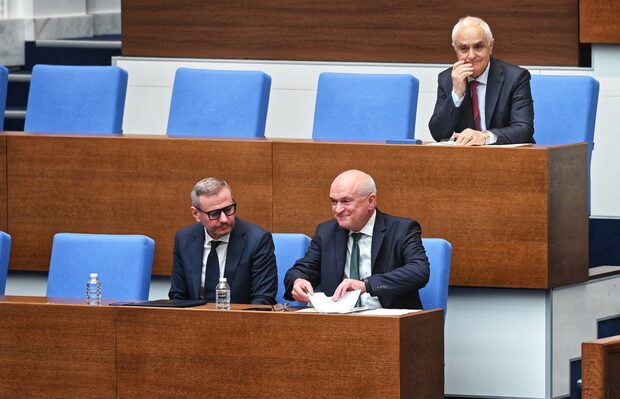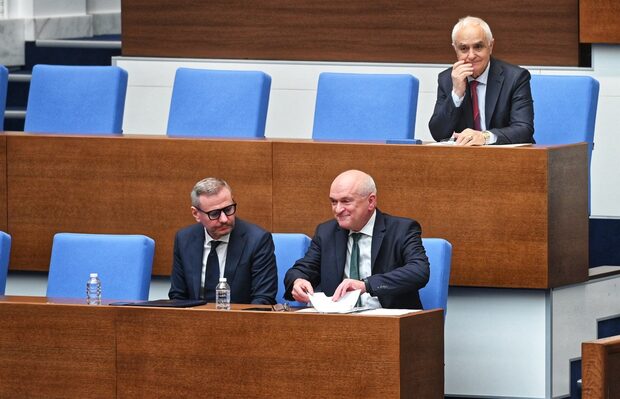A few years back, Ivan Krastev wrote about the "demographic anxiety" in the depopulating countries of New Europe, attributing all sorts of democratic ailments to the phenomenon - populism, illiberalism, political apathy you name it.
For decades, Bulgarians have been leading demographic doomers, foreshadowing the imminent end of the nation - топим се, or "we are melting off" has been a motif every year around this time, when the National Statistics Office publishes its annual demographic numbers.
But this year the numbers could surprise even arch pessimists. While the overall trend of population decline goes on and the country has shrunk by 2229 people in a year, this number is magnitudes smaller than the five-digit declines measured in former years. What is more, for the first time in almost three decades, there have been more babies born compared to the previous year - 57,197, or 601 more compared to 2022!
Add to that the continuing trend of a modest mechanical population growth (the number of people who immigrated to Bulgaria minus those who emigrated) - 41,600 people, mostly from Ukraine, Russia and Turkey, and you get a much less somber picture than usual.
Thus, two of the three components of the demographic balance point upwards. But they can hardly compensate for the third component - the high mortality rate of 15.7 ppm, a third higher than the average EU level of 11.5 ppm. Notoriously, this number is almost twice as high in some districts such as Vidin, Montana and Gabrovo. The negative natural growth of the population (the number of deaths minus the number of births) has been 43,500 people.
But let us leave you for the holidays with this bold prediction. To judge from the numbers of the past few years, next year will be the first in the modern history of post-communist Bulgaria to see a modest growth of population. Now that would make for a lot of talk shows and headlines.
1. Politics this week
The gambling ban comes into forceAfter dismissing a similar ban on the advertisement of gambling on national radio and TV proposed by Vazrazhdane a few weeks back, MRF and GERB proposed and, in a matter of days, pushed through one of their own. While such a ban is overdue, it's unlikely to hit the online betting industry, which has proliferated so much in recent years that the number of online betting shops and casinos around the country can no longer be counted.
Sudden death for the advertising and media business
Yet this is like a death knell for a whole host of industries: TV, websites, and advertising companies, which have reaped millions from the gold mine that is online betting. A rough estimate shows that the two leading TV stations - bTV and Nova - stand to lose tens of millions of levs of revenue alone at a stroke.
As much as we want to say "well, this serves you right for tying your boat to that ship", that's a worrying trend. First, because it shows the precariousness of the media business in Bulgaria if it is dependent on a small pack of betting companies. And second, because politicians can take away that revenue in a week. And that is even more troubling.
A new front opens up against WCC: this time, because of a signature
Ten days before the start of the election campaign, it seems that Bulgaria's scandal-ridden society got distracted and ceased paying attention to the raid in the Customs Agency and the alleged involvement of WCC-DB, so (coincidently or not) a new scandal was produced. At the beginning of the week, the Prosecutor's office announced it is investigating the former head of Kiril Petkov's office, Lena Borislavova, for documental crimes committed exactly three years ago. The announcement of the pre-trial proceedings came just days after the investigative website Bivol published information on the case.
While it is certainly true that Petkov and co. are not scrupulous about signing documents (remember the Canadian citizenship debacle from when he first entered politics?), it is extremely strange - to say the least - that the authorities chose to revive the case, which is linked to Petkov's withdrawal from an environmental NGO when he launched his party in 2021, right now.
And what about the "Notary?"
And while new scandals pop up and "old" ones (at least by Bulgarian standards) like the Customs Agency debacle die down without much ado, some are just buried by the implicated. You'd be forgiven if you've already forgotten about the parliamentary investigation into the activities of the judicial-political lobbyist Martin "the Notary" Bojanov, who was murdered in January, but this week it ended as most such committees end: it failed to come up with an official report into its activities after it was sabotaged by GERB and MRF.
Committee chairman Nikola Minchev from WCC-DB announced that the report could not be adopted due to the lack of a quorum, as only five members were present in the chamber. This could hardly surprise anyone, especially bearing in mind that the Anti-Corruption Fund published an Access to Information response from the Organized Crime Police Directorate (GDPOP) which showed that the Notary was, indeed, a police informant who benefited from protection somewhere high in the ranks of the Prosecution, and likely - politics, because several police investigations into his activities and links to magistrates were blocked by the prosecutors.
2. Economy
Bankruptcies in Bulgaria decrease by 10% in 2023: CofaceBankruptcies in Bulgaria were down by more than 10% in 2023, making the country one of only three in Central and Eastern Europe (CEE) to see a decline, data from insurance and credit risk management company Coface shows. Last year, the number of companies declared bankrupt in the local market was 476, compared to 532 in 2022 and 516 in 2021, compared to an overall increase in the rate of bankruptcies in the region of 39%, driven mainly by Hungary (+152%) and Poland (+71%). The rapid growth in the two is the result not only of the worsening economic situation, but also of local market specificities and changes in insolvency regulations.
"For the first time in several years, we are seeing a 10.53% year-on-year decline in the number of insolvencies in Bulgaria compared to 2022. Our country is one of the few exceptions for 2023 compared to the rest of the CEE region, but this does not necessarily mean that the situation is stable and improving for local businesses," Cofas Bulgaria Managing Director Plamen Dimitrov says. In his words, the actual number of firms that have experienced difficulties in paying their debts has actually increased, but this is not reflected in the bankruptcy statistics, as "it seems more convenient to abandon or sell the company instead of starting bankruptcy proceedings."
3. Business
Mining AurubisThe largest company in Bulgaria is launching its most significant investment program since it entered the country in 2008. It will be implemented over the next four years in the copper mining plant near Pirdop and Zlatitsa where the company plans to invest a total of 400 million euro in increasing the production of pure copper, building more solar parks for its own needs, replacing equipment with energy-efficient and other projects.
4. Energy:
Three international consortia bid for a 586 million levs tender to construct North-South gas corridorThree consortia with the participation of American, Romanian and Polish companies - Hill International - GBS 1, Negru Voda Kardam 2024 and Hill International - GBS 2 - have submitted bids for participation in the public tender of the state-owned gas company Bulgartransgaz for the design, supply of equipment, construction and commissioning of the so-called Vertical Gas Corridor - a megaproject on the initiative of the gas transmission operators of Bulgaria, Greece, Romania, Hungary, Slovakia, Ukraine and Moldova that aims to provide sufficient gas transmission capacity along the south-north axis, which will be particularly important given the planned complete shutdown of Russian transit through Ukraine from 2025.
The project is important because through the Vertical Gas Corridor and the old Trans-Balkan pipeline, which is not being used, LNG supplies can be made to Ukraine and to the other countries that are part of the future gas route.
5. Watch out for:
Place: Patriarch Evtimiy Boulevard in SofiaOne of the iconic transport hubs at the heart of the capital had become the object of controversy as municipal plans to revamp it that included the creation of a bus lane and a bicycle alley were vehemently opposed by local residents and municipal councilors from most parties (bar WCC-DB) alike. Apparently the projects, which have been part of the development strategy of the City Council for over a decade, "surprised" politicians and citizens who prefer to continue living in a semi-permanent traffic jam.
Institution:
The first "modern" jail in Bulgaria "opens" doorsThe 42 million levs correction facility near the Samokov village of Samoranovo is the first of its kind in the country in that it will allow inmates to walk freely within its premises, as well as work in specially created facilities.
Person:
Rumen Radev
On Monday, President Rumen Radev vetoed seven paragraphs of the controversial amendments to the Investment Promotion Act and the Environmental Protection Act pushed without public consultation by MRF and GERB, which aimed to create a "fast track" for investment projects and circumvent eco-evaluations, despite the opposition of civil society and environmental organizations.
A few years back, Ivan Krastev wrote about the "demographic anxiety" in the depopulating countries of New Europe, attributing all sorts of democratic ailments to the phenomenon - populism, illiberalism, political apathy you name it.
For decades, Bulgarians have been leading demographic doomers, foreshadowing the imminent end of the nation - топим се, or "we are melting off" has been a motif every year around this time, when the National Statistics Office publishes its annual demographic numbers.












